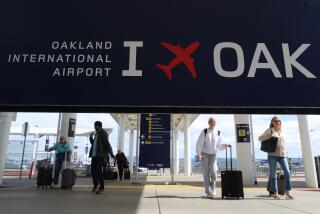Trial Begins in Residents’ Suit on Burbank Airport Noise
- Share via
With the way paved by an important California Supreme Court ruling on the legal rights of airport neighbors, trial began Monday in a lawsuit brought by annoyed homeowners against Burbank Airport.
The trial is being watched by both sides in the dispute over aircraft noise.
Airport operators have protested that the lawsuit poses a serious financial threat to the future of the state’s airports. Neighborhood groups see the suit as perhaps their best chance to limit noise from increasingly busy airports.
Each side presented a brief Monday to Superior Court Judge Robert I. Weil, who will hear the case without a jury.
In 1985, the state Supreme Court ruled that neighbors could sue airports as “continuing” nuisances--meaning the same plaintiff could file a theoretically unlimited number of suits based on nuisances, such as jet noise, that occur repeatedly.
Decision Reversed
The ruling reversed a decision won by the Burbank-Glendale-Pasadena Airport Authority, which operates the airport, shortly after the suits were filed in 1983. A Superior Court judge dismissed the suits, agreeing with the airport’s argument that it is a “permanent” nuisance, which would have limited neighbors to one lawsuit for the same kind of nuisance.
In that case, the airport argued, the five-year statute of limitation blocked such suits, because the airport has been in operation since 1930.
The airport authority appealed the state high court’s ruling to the U.S. Supreme Court, which refused to hear the case.
Pressured by the cities that own the state’s major commercial airports, the Legislature in 1983, 1984 and 1986 passed bills that would have barred suits against airport authorities as “continuing” nuisances.
In each case, Gov. George Deukmejian vetoed the bills, saying in 1986 that the courts should decide the matter because “the issues can more appropriately be discussed there, without the political pressures which surround this very sensitive local issue.”
Airport operators argue that they have no way of predicting what they may have to pay in legal judgments and lawyers’ fees if they must fight repeated lawsuits by the same neighbors.
Unpredictable Debts
One of the most serious effects, they argue, is that the unpredictability of their future debts worries the financial markets that rate the bonds airports sell to pay for improvements. Unpredictable expenses lead to lower ratings for the bonds, which force the airports to pay higher interest on loans, perhaps making some projects financially impossible.
Burbank Airport is planning to build a terminal in the 1990s at an estimated cost of more than $150 million, mostly financed by bonds.
Homeowner groups, for their part, see the court actions as a way of getting a grip on airport administrators that cannot be ignored.
They complain that action using legislative, political and regulatory channels is usually futile because of the diffused nature of the commercial air-travel network, in which local authorities control airports but the federal government controls aircraft in flight.
The trial that began Monday pits 24 plaintiffs from Burbank, North Hollywood and Sunland against the airport authority, said the attorney for the homeowners, John J. Schimmenti. They were selected to be a representative group from about 600 plaintiffs, he said.
Attorneys for both sides agreed to limit the number of plaintiffs in this trial to avoid making the complex legal battle more complicated than necessary, he said. The smaller number of plaintiffs makes the case “more manageable,” said Richard K. Simon, attorney for the airport authority.
The result of this case will not set a binding precedent, but will serve as “a guideline, an indicator” of the legal issues involved in the other pending suits, Simon said.
Both attorneys estimated the trial will take about three or four weeks.
The homeowners say that, in addition to the aggravation caused by jet noise, they have been subject to “inverse condemnation.” They argue that a government agency, the airport authority, has taken from them property of value: the power to inflict noise on their houses has lowered the value of their homes.
The airport argues, in part, that if it has taken anything from the homeowners, the process should be considered a “prescriptive avigation easement.” An easement is the right to use someone else’s property. “Avigation” refers to the right to fly over property. An easement can be acquired by “prescription” if the owner did not protest the use of the easement within five years after the use began.
More to Read
Sign up for Essential California
The most important California stories and recommendations in your inbox every morning.
You may occasionally receive promotional content from the Los Angeles Times.













